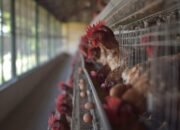In a world where nearly one-third of all food produced goes to waste, a groundbreaking solution emerges: fully refrigerated food supply chains. A recent study conducted by the University of Michigan reveals that these “cold chains” have the potential to eliminate approximately 620 million metric tons of food waste annually. But that’s not all—by embracing refrigeration, we can also slash greenhouse gas emissions related to food waste by a staggering 41% globally. Let’s delve into the details and explore how this innovation could transform our approach to food security and environmental sustainability.

The Cold Chain Revolution
Imagine a seamless network where food travels from farm to table, maintaining optimal freshness throughout its journey. The cold chain concept involves keeping perishable items consistently refrigerated, ensuring longer shelf life and reducing spoilage. By implementing this approach on a global scale, we can significantly curb food waste.
Sub-Saharan Africa and South/Southeast Asia: Hotspots for Change
These regions hold immense potential for cold chain adoption. Sub-Saharan Africa, with its rich agricultural heritage, could see a remarkable 47% reduction in food losses and a whopping 66% decrease in associated emissions. Similarly, South and Southeast Asia stand to benefit significantly, with a projected 45% reduction in food losses and a 54% cut in emissions. These statistics underscore the transformative impact of refrigeration in regions where hunger persists.
Beyond Industrial Chains: Localized Solutions
While large-scale cold chains offer substantial benefits, let’s not overlook localized alternatives. Imagine community-driven “farm-to-table” supply chains, where small-scale producers collaborate to minimize waste. These decentralized systems, rooted in local economies, can yield food savings comparable to their industrial counterparts. By empowering local communities, we create resilient food systems that thrive on sustainability.
















